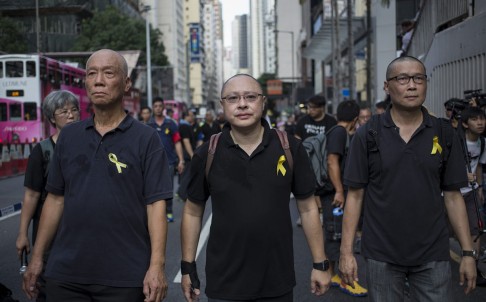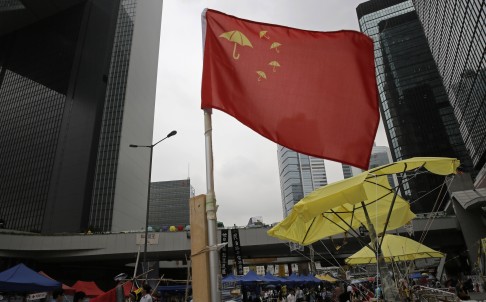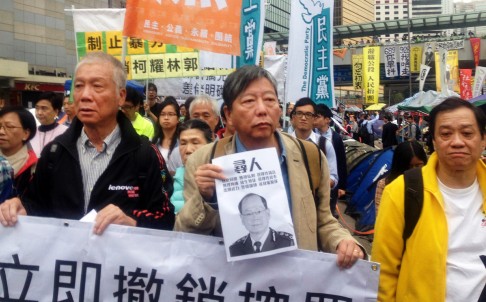Occupy Central
Occupy Central is a civil disobedience movement which began in Hong Kong on September 28, 2014. It calls on thousands of protesters to block roads and paralyse Hong Kong's financial district if the Beijing and Hong Kong governments do not agree to implement universal suffrage for the chief executive election in 2017 and the Legislative Council elections in 2020 according to "international standards." The movement was initiated by Benny Tai Yiu-ting (戴耀廷), an associate professor of law at the University of Hong Kong, in January 2013.
OCCUPY CENTRAL - DAY 47: Full coverage of the day’s events
PUBLISHED : Thursday, 13 November, 2014, 5:21am
UPDATED : Thursday, 13 November, 2014, 5:21am
Hong Kong Occupy leaders crave arrest and persecution
The Reverend Chu Yiu-ming, Benny Tai Yiu-ting and Dr Chan Kin-man say they "tentatively" plan to surrender to police.
Some of the original grandees of the Occupy movement, who have disappeared from the scene lately, are ready for a second act.
Having been upstaged by young protesters and student activists, the three "gentlemen" of Occupy Central say they want to turn themselves in.
The Reverend Chu Yiu-ming, Benny Tai Yiu-ting and Dr Chan Kin-man say they "tentatively" plan to surrender to police. But why "tentatively"? One supposes they can always change their mind, as they frequently do. Having promised something like Occupy Central with Love and Peace, they have delivered nothing of the sort. The occupiers are neither loving nor peaceful; and they didn't occupy the Central business district either.
Indeed, many have repudiated the trio's leadership, which was non-existent to begin with. You would hope these three men would have the good grace to admit defeat and go home. But no, they say they have achieved some of their goals. When you have a shipwreck in the middle of nowhere, you can always claim that has been your destination all along. Whatever you think about the student leaders, at least they can lead a crowd and square off with government honchos on TV. That's more than you can say about those three gentlemen.
Now Shiu Ka-chun, a social work lecturer at Baptist University and an Occupy steward, says he is ready to join them in surrendering to the police. "Civil disobedience has two elements - paralysing the city's operation and self-sacrifice," he said. But Shiu complains people are unwilling to sacrifice themselves. "We have done the disruption but not many people are willing to do the latter part."
But who is asking anyone to sacrifice themselves? Police have not issued arrest warrants. You can perhaps claim to have committed a crime and demand an officer arrest you. Our gentlemen are so desperate to be seen being persecuted they are begging for an arrest.
I hate to point out the obvious. Hong Kong is a free city, so we have been dealing with protesters the way free cities do. For a short time, the world thought we were about to have a Hong Kong spring or a "colour revolution".
They mistook Hong Kong 2014 for Beijing 1989, and "one country, two systems" for communist rule.
This article appeared in the South China Morning Post print edition as Occupy trio crave arrest, persecution
PUBLISHED : Thursday, 13 November, 2014, 2:57pm
UPDATED : Friday, 14 November, 2014, 5:26am
Our youth want a say in their future, not crumbs from tycoons' dinner plates
Albert Cheng says by their words and deeds, Hong Kong's old guard show they haven't really understood the yearning for equality and social justice
A flag with the image of an umbrella flies in an occupied area outside the government headquarters in Admiralty. Photo: AP
At 77, former chief executive Tung Chee-hwa is trying to pick up the political pieces the old-fashioned way. He has assembled his allies and former aides to launch a think tank to talk about ways to, among other missions, improve the housing and economic conditions for the young and furious.
Like Tung himself, some of those he has enlisted were either caught in controversies or bowed out in disgrace. The local Chinese press has coined a name for them - used batteries. Tung has also recruited some of the second and third generations of tycoons in town.
However, none of the democratic activists have been invited. This is not surprising; after all, Tung's Our Hong Kong Foundation has been billed by some as a vehicle to promote his former financial secretary Antony Leung Kam-chung as the next chief executive.
Leung, 62, delivered the keynote speech at the launch of the foundation on Sunday. His speech was reminiscent of a campaign manifesto. He sees Occupy Central as a manifestation of three destabilising factors: a generation gap, conflicts between Hong Kong and the mainland, and a widening wealth gap caused by low taxes and high land prices.
He said Occupy had exposed problems in social governance, economic transition and youth development. In his view, the solution lies in improving upward mobility for young people by building more affordable housing for them. Another way is to set up a government fund to supplement initiatives to support young entrepreneurs. These measures would supposedly put the frustrated young people on the track to hope and harmony.
This diagnosis is way off the mark and reflects how out of touch Leung and the other old guards are. Asking the vested business interests to plough back a little portion of their huge profits can hardly make an impact.
Nobody will dispute that the crisis is related to youth issues. Offering them better housing and careers will, of course, help ease the tension. However, the core of the so-called youth problems has transcended the immediate want of social stability and personal prosperity.
Just look at the recent commentary in The New York Times by Joshua Wong Chi-fung. As he put it: "The people of my generation want more. In a world where ideas and ideals flow freely, we want what everybody else in an advanced society seems to have: a say in our future."
The youngsters' frustration is not confined to a bleak economic outlook for themselves. It is about justice, equality in political right, fair use of social capital, cultural liberation, environmental conservation and possibilities of alternative ways for growth. In the parlance of social psychology, they are after self-actualisation.
The youth-led movement has been labelled the Umbrella Revolution. It is indeed a revolution in many senses. Those in government and Tung's think tank are not even speaking the language of the youth, let alone addressing the real issues.
The old guard have been repeating the theme that our future is intertwined with that of the motherland. Their mentality is, as captured in Tung's often ridiculed refrain: "Good for the country, good for Hong Kong." It wasn't appealing 15 years ago. It is even less so today.
The psychological gap between Hong Kong and the mainland has been widening since reunification in 1997. This is evident in the slogans and motifs used in the protests. Many young people are ready to make financial sacrifices to, for example, drastically cut the number of mainland tourists. One of their worst nightmares is a Hong Kong dominated by mainland interests and downgraded to just another Chinese city.
In fact, most occupiers are not students or less-educated, jobless youngsters. According to a survey by the pro-government Sing Tao Daily, about half the protesters in Admiralty are between 21 and 30, but only one-fifth are students. Most have a full-time job. Employers and professionals from the finance sector are among those still at the occupied sites. Occupy is more complicated than a conflict between the haves and the have-nots.
The old dogs have failed to learn any new tricks to tackle the sentiments of discontent. Young people want equal opportunities, not just opportunities on the mainland. To achieve this, we need a complete overhaul of the electoral system to recognise that everyone is born equal, at least politically.
Tung and others have said the students' message was loud and clear. Yet, they have not made any concession to accommodate their demands for change. Our Hong Kong Foundation will not make much of a difference if it does not even accept the students' demand for an equitable electoral system to start with.
Albert Cheng King-hon is a political commentator.taipan@albertcheng.hk
This article appeared in the South China Morning Post print edition as Our youth want a say in their future, not crumbs from tycoons' dinner plates
Arrest of Occupy Central marshals damages trust in police, protesters say
March to police headquarters demands that pair who came to tycoon's aid after animal innards attack are cleared of any wrongdoing
PUBLISHED : Thursday, 13 November, 2014, 5:15pm
Lee Cheuk-yan leads protesters in a march to police headquarters. Photo: Alan Yu
About 100 people marched to police headquarters yesterday to protest over the arrest of two Occupy Central marshals after they subdued three men who threw animal innards at media tycoon Jimmy Lai Chee-ying.
The pair were among five people arrested on Wednesday after Lai was struck in the face with the bloody organs at his tent in the Occupy protest zone in Harcourt Road, Admiralty.
Witnesses said the three who launched the attack spoke Cantonese with local accents and swore at the Next Media founder. They were subdued by protesters, who tied their limbs with plastic cables. The men were arrested on suspicion of common assault and fighting in public.
Alex Kwok Siu-kit, head of a 50-strong team of marshals in Admiralty, and colleague Ricky Or Yiu-lam were also arrested on suspicion of fighting.
The marshals were released on bail yesterday morning. But their arrest infuriated Occupy supporters, who called on police to apologise and drop the case.
Pan-democratic lawmakers including Lee Cheuk-yan, "Long Hair" Leung Kwok-hung and Emily Lau Wai-hing joined about 100 people on the march from the Admiralty protest site. The marchers did not seek police permission as required by law and said their protest - like the Occupy campaign as a whole - was an act of civil disobedience.
Several police officers tried to stop the group on Harcourt Road but were heavily outnumbered, and the march continued to police headquarters in Arsenal Street, Wan Chai.
Our interview with Alex Kwok Siu-kit recently:
The protesters chanted calls for the police to drop the case against the marshals and for Commissioner of Police Andy Tsang Wai-hung to resign. They expressed concern that government officials and police management would put frontline officers under pressure to serve political ends.
"For years, we were taught to help the police fight crime," said Or, one of the arrested marshals. "But it turns out helping the police means we'll start as witnesses and end up as suspects and get charged."
He said the police's actions could destroy trust in the force. Police were already under fire over the use of tear gas and pepper spray earlier in the protest.
In a statement yesterday, the police force said members of the public should use only reasonable and proportionate force to restrain the perpetrator of the crime. Anyone who used excessive force to apprehend a suspect could face legal consequences, the statement warned.
This article appeared in the South China Morning Post print edition as Arrest of marshals 'hits trust in police'







沒有留言:
張貼留言